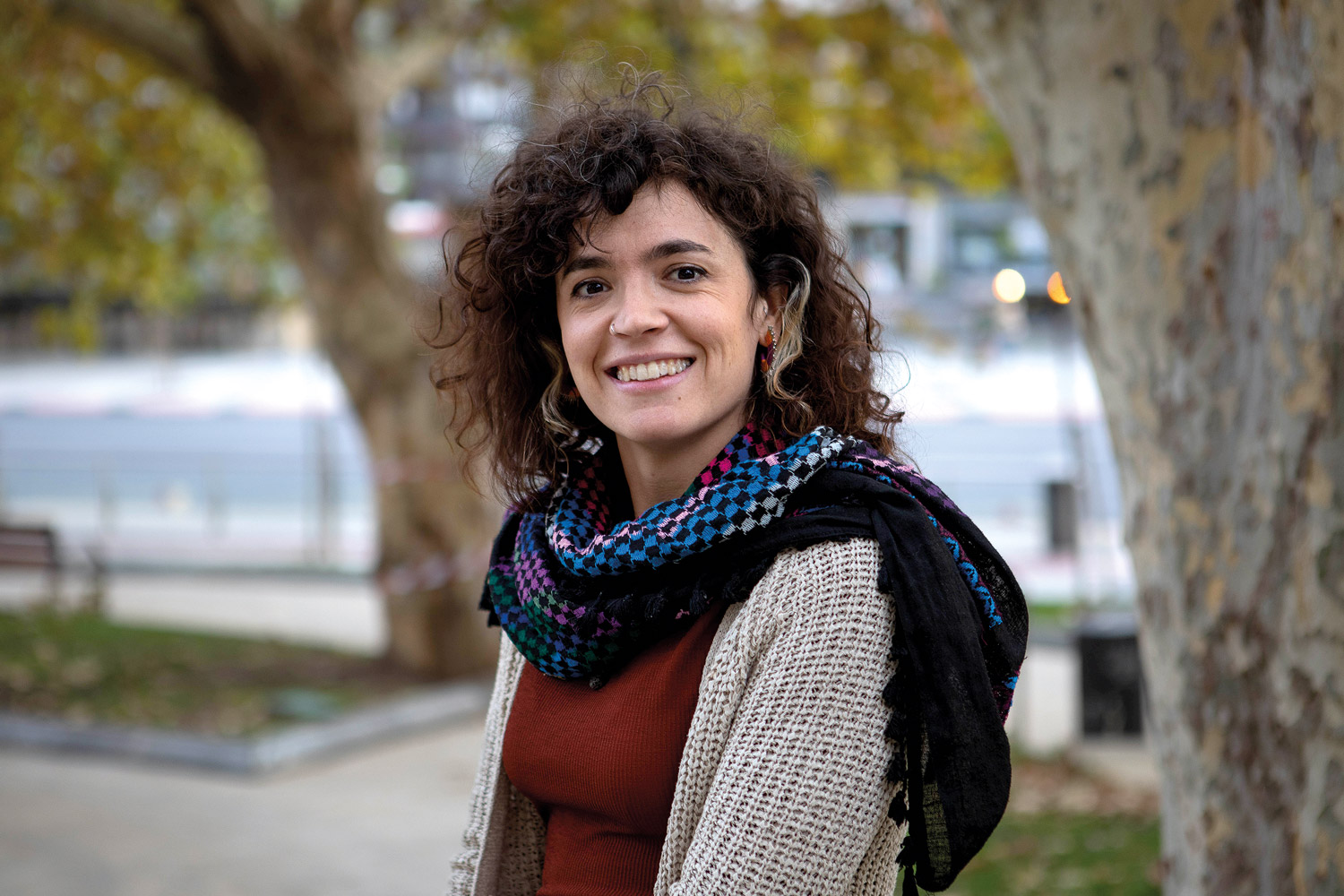
- Oriotarra Arrieta started working three years ago at UNRWA, the United Nations Agency for Assistance to Palestine Refugees in the Middle East. After the 1948 Nakba, the organization was created to help 700,000 refugees. In Euskal Herria, Arrieta works in educational centers to inform the new generations of the history of Palestine and the current situation, always with the Palestinians who live here. The interview is prior to the recent events in Israel and Palestine.

How do you explain to teens what's going on?
I always see the context, and in this case, in addition to the current one, the historical context is essential. Many young people don't even put Palestine on the map. Maybe and just gauze. We work directly with the Palestinian refugees, with those living in the Basque Country, and they come with me to the schools. That, in my opinion, is the most attractive way to know the real story, from word to mouth, with the natives.
Are young Basques curious?
I would say yes, but if you don't tell them, if you don't teach them, you don't know. Mass media only know how little they count and that doesn't know either. We are talking mainly about the West Bank and Gaza. When you're told in the West Bank that there's a 700-kilometer wall built in 2002, when you see that checkpoints, the permanent military presence, which would be a short run, have to overcome all of these obstacles, young people are surprised.
Few know about the blockade of Gaza. When they discover that they cannot leave and cannot enter, directly from the mouth of a Palestinian refugee, it is easier for them to imagine their daily lives.

Ahlam. Dreaming of a life you have taken the comic book as a tool.
Yes, it is essential to use an attractive, updated working methodology. Comics is an effective tool. Messages are simple, correct and their image composition helps a lot.
To complete the latter, we had the opportunity to speak with more than 20 Palestinian refugee women in Lebanon. In the end, four are the protagonists of the book: Ahlam, Hiba, Wahida and Rawaa. We wanted to make visible the reality of different ages, professions and camps. From his account, the comic explains his daily life.
Rawaa, for example, is a woman working in social services. Wahida is a woman who fled the war in Syria. In Syria he was already a refugee, so he had to take refuge for the second time ten years ago. Through Hiba we wanted to make the lives of young women appear. Sport is her passion and the book reveals a thousand obstacles she has to overcome as a woman.
In short, it tells of its humanitarian situation in Lebanon. We wanted to express what it means to live with the dream of another life, breaking Eurocentrism and treating and looking at these women equally.
Eurocentrism anywhere…
Yes, unfortunately. Although we believe otherwise, in Lebanon, for example, and in most other places, women are organized. They are not victims. You have the floor. In our imaginary, the Arab woman is oppressed, not clear, silent, they are all equal -- and not. That's what we work at the centers. The challenge is to break that. But the methodology must be attractive to “catch” adolescents. That's why we act with live testimonies, videos and comics, among others. You see that Palestinian women are on Instagram, they're youtubers, and prejudices are completely broken.

He has worked with refugees from Lebanon.
I've had the opportunity to make a work trip. It can be said that there are the worst conditions to be a refugee and that those there are living in the worst situation: high unemployment, inflation, irregular immigration, wanting to flee and not being able to. Refugee status does not guarantee much. They are very crowded camps, a simple piece of land, no plaza, no park… high concrete dwellings that have to grow upward or not due to lack of space.
I worked with women, develop strategies to face daily life. Kitchens are very important, for example. There they organize, from where food, knowledge and Palestinian culture are transmitted. Of course, I attach great importance to it. They have also achieved paid work, creating small businesses.
When we tend to go there, we're going to learn, to offer material resources to work with them. We're not going to teach anything. You know, and more than we do! Here is not us and they. It's all of us. It is very important to act from the point of view of international co-participation. We assimilate ourselves.
We are ignorant.
We are very ignorant and we mix everything, Muslims, Arabs, we mix all!
We settle for simple headlines and a couple of images, and we think we already know, and not! How many times have I said that there are Arabs who are not Muslims and vice versa! We must recover the context, the information coming from different sources and the hunger for knowledge to understand what is really happening in the world.
“Sei milioi pertsona errefuxiatu palestinar daude munduan barrena, eta gehienak, han daude: Zisjordania, Gaza, Jordania, Siria eta Libanon. 'Errefuxiatu' hitzaren aurretik 'pertsona' erabiltzen dut, sarri migratzaile edo errefuxiatu hitzaren inguruan etiketa moduko bat sortzen dugulako gure iruditerian, zenbaki bat bailitzan, eta pertsonak direla ahazten dugu. Zu eta ni bezalakoak, bizirautearen gurpil zoroan bizi direnak. Alabaina, asko antolatuta daude, badute hitza, eta ez ditugu bigarren mailakotzat hartu behar. Eurozentrismoa oso kaltegarria da, ikuspuntu arrazista du eta ezjakin hutsak gara. Hori iraultzen ahalegintzen naiz ikastetxeetan, gizarte eraldaketarako hezkuntzan”.